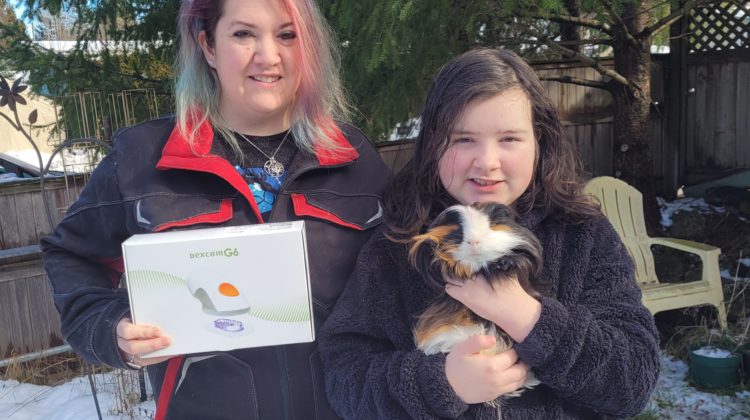B.C. becoming the first province to reimburse diabetes patients who use Dexcom G6 is welcome news for a Vancouver Island mom.
Dexcom is a continuous glucose monitor (CGM) that provides regular updates on blood levels throughout the day.
It will now be covered through BC PharmaCare.
Lisa Christensen’s daughter, Lillithe, uses Dexcom to manage her Type 1 diabetes.
Christensen says the most important thing about Dexcom is it gives you constant access to your blood glucose number.
“So if you go too high or too low it can become dangerous for you,” she explained. “So with the Dexcom you can see where you’re headed and you can make sure that nothing dangerous happens.”
Until now, CGM devices have not widely been covered through private insurance or public funding in B.C., leaving many parents to pay thousands of dollars out-of-pocket.
When it comes to Dexcom, that’s no longer the case.
“I was quite surprised by the news and it’s very important to people with diabetes,” she said. “This is an excellent step in the right direction to get everybody covered.”
Christenen says without coverage, CGM technology costs families around $300 per month on a subscription.
For several years Christensen has been advocating for the province to make CGMs the standard of care for all parents who have children living with the disease.
“It’s really difficult because not everybody qualifies for the charity programs so there are a lot of people that have been paying out of pocket,” she said. “It’s indispensable for children, especially, but for any diabetic.”
Christensen says their family have been among the lucky ones because they were able to get a grant from a charity called Bear Essentials.
(Bear Essentials is a family support program that assists with the costs of health-related travel and equipment for Vancouver Island kids).
“We’re going to qualify under Pharmacare which is going to be really good because our funding had already run out with Bear Essentials, and they very generously extended it for one more period,” Christensen said.
The coverage, through BC PharmaCare, is for people over the age of two, who have Type 1 Diabetes (T1D) or Type 2 Diabetes (T2D) and use insulin.
More than 520,000 people in B.C. are diagnosed with T1D and T2D and estimates are that an additional 1M people have undiagnosed T2D and prediabetes combined.
The Dexcom G6 CGM System includes a small, wearable sensor that measures glucose just below the skin; a transmitter to continuously and wirelessly send glucose levels to a display device; and a compatible smart device or receiver that displays real-time glucose data to users without the need for finger sticks or scanning.
CGM devices like the Dexcom G6 can help improve diabetes management and quality of life for both the patient and their caregivers, increasing confidence and reducing stress by making blood glucose readings easier to obtain.
With the increase in use of telemedicine practices as a result of COVID, devices like CGMs have been valuable in helping doctors monitor patients’ levels remotely and in real-time.
Christensen says this helps families sleep at night, knowing Dexcom will send an alert if anything starts to get out of range.
She added that they have decreased their A1C substantially using the information the Dexcom provides.
“We have tighter control of our numbers and are down to 6.1 A1C,” she said.
“It is considered ‘acceptable control’ for kids to be more like 7.0 to 7.5 because they want to run them high (to) reduce the risk of lows that might not get caught when doing finger pokes. The constant access to data with Dexcom means it’s safer to stay in range.”
‘Normal’ range for A1C is below 5.7.
“We have also been able to prevent any significant lows from happening the entire time we have been on Dexcom,” Christensen added.
“Lows can take a long time to feel recovered from, so it is very important that we can prevent them, so Lillithe can have a fairly normal life as an active child.”




